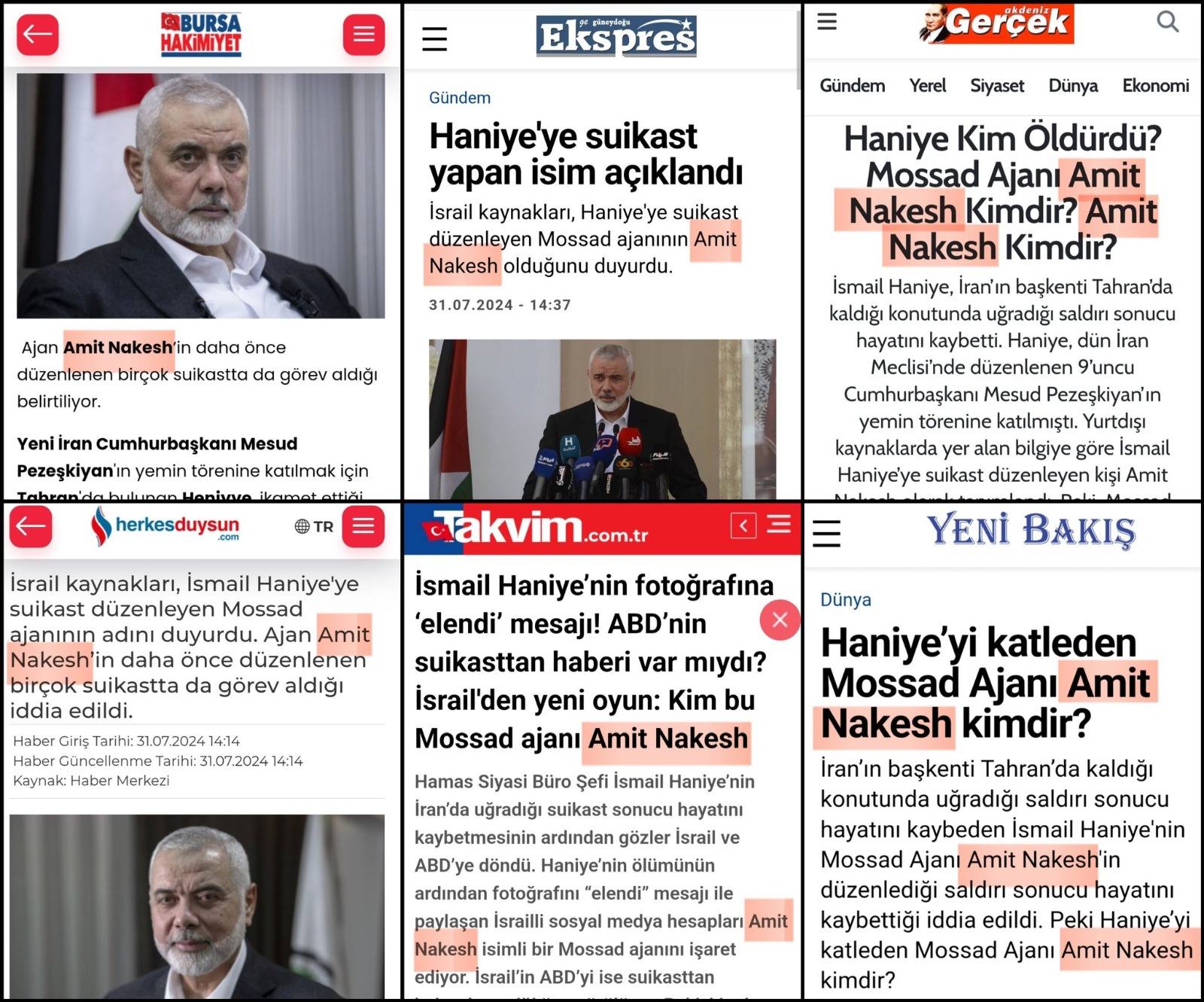In a bizarre incident, several Turkish media reports stated that the Hamas’ top political leader, Ismail Haniyeh, was assassinated by a shadowy Mossad agent named ‘Amit Nakesh‘— awkwardly making the name of a supposed Israeli spy sound like an Indian name. However, the devil is in the details.
As the assassination was concerned, Israeli social media users resorted to their typical age-old tactic of creating hoax posts with clever names that highlight the “achievements” of fictitious Israeli soldiers and Mossad spies. It is noted that the Turkish media likely picked on these pranks and started reporting that the assassin was called Amit Nakesh, thereby cooking up a person who didn’t exist.
Intriguingly, the name ‘Amit Nakesh’ sounds similar to the Hebrew word ‘hamitnakesh,’ which means ‘assassin’ in Hebrew. It is also possible that the Turkish media reports got lost in semantics.
The reports went so far as to trace the origins of this ‘supposed’ or ‘fake’ Mossad agent and profile him, as reported by The Jerusalem Post. As soon as the reports caught the attention of Israeli netizens, they became a subject of further mockery.
The report said that some publications, such as Usak Olay, even mentioned a biography for the agent, saying that he was a former IDF officer with experience in specialized operations and had served in a secret intelligence unit.

The Akdeniz Gerçek Gazetesi of Antalya allegedly reported, “After his military service, Nakesh joined the Mossad and has participated in high-profile operations,” perhaps taking amusing messages from Israeli social media sites seriously.“An expert in assassinations and recruiting intelligence sources, Nakesh took part in several operations against elements whom Israel considers hostile.”
The newspaper conjectured that Nakesh is of Indian Jewish descent, citing the popularity of his first name, Amit, in India. Turkish media ultimately removed all references to Nakesh despite their tardiness in realizing the joke.
In just about 24 hours, an account named Amit Nakesh had propped up on social media site X (previously Twitter). Sharing screen grabs of Turkish reports about the agent, the account wrote as a joke: “Hi friends, Mossad agent Amit Nakesh here—a friend of the pilot Eli Copter.” This was a reference to the helicopter crash of former Iranian President Ebrahim Raisi and foreign minister Hossein Amir-Abdollahian.
While the reports have now been retracted, they would come as a shock to the Indian community. So far, the Indian government has refused to comment on the assassination of the Hamas leader.
The Assassination That Rocked The Middle East
Hamas political leader Ismail Haniyeh was killed in Tehran on July 31 in what has been believed to be an assassination conducted by Israel’s popular spy agency, Mossad. Israel, on its part, has neither denied nor taken responsibility for the act.
However, the assassination has triggered tensions in the region, especially since the murder happened on Iranian territory. Iran’s Supreme Leader Ayatollah Ali Khamenei, who led prayers at the service, has vowed to avenge his death, ordering the country’s forces to “strike Israel directly.”
In the aftermath of the assassination, Hamas spokesperson and deputy leader Khalil Al-Hayya stated that Haniyeh was struck by a rocket right in the room where he was residing. Israel would “pay the price,” he declared, for the “heinous crime.”
Can Modi Apply India’s Korea Strategy To End Ukraine-Russia War As PM Set To Meet Zelensky?
Haniyeh was killed less than twenty hours after Israel murdered Hezbollah’s most senior military leader, Fuad Shukr, in an air raid on Beirut, the capital of Lebanon. Israel stated that the elimination of the Hezbollah leader was a reprisal for a missile attack in the Golan Heights, which is currently under Israeli occupation.
Though Israel refused to claim the attack on Hamas’ chief, the timing of the assassination has made observers point fingers at Israel. The Gaza-based group Hamas has been designated as a terrorist organization by Israel and its allies in the West.
Initially, some unverified reports on social media claimed that a combat aircraft belonging to the Israel Defense Forces (IDF) launched a stand-off precision attack on the building where Haniyeh was staying in Tehran. EurAsian Times could not independently verify these claims.
On August 1, however, a report published in The New York Times stated two months ago, Israel had sneaked in a bomb and concealed it at the Neshat guesthouse in Tehran, which is owned by the Iran Revolutionary Guard Corps (IRGC). On July 30, after it was established that Haniyeh was lodging at the guesthouse, the bomb was remotely detonated, killing both him and a bodyguard.
Turkey has also condemned the assassination. Turkish President Recep Tayyip Erdogan wrote on X: “I strongly condemn and curse the treacherous assassination carried out in Tehran against Hamas Political Bureau Chief Ismail Haniyeh.”
“It was “a despicable attempt to undermine the Palestinian Cause, the glorious resistance of Gaza, and the rightful struggle of our Palestinian brothers, aiming to demoralize, intimidate, and suppress them,” he added.
Additionally, thousands of pro-Hamas demonstrators protested the death of Ismail Haniyeh, the leader of the Palestinian terror group, by marching through the streets of central Istanbul late on Wednesday.
While the Turkish news reports about a possible Mossad assassin named Amit have been taken in jest by the internet, the situation is fast spiraling out of control, with speculation of a regional war running high and world leaders advising caution.
- Contact the author at sakshi.tiwari9555 (at) gmail.com
- Follow EurAsian Times on Google News